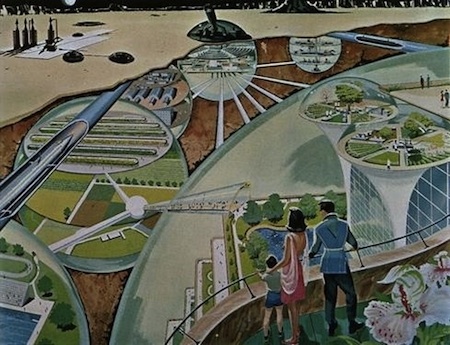Every generation looks back several generations, mining earlier eras for cultural ideas to be reinvented in its own image. Such nostalgia+remixing tends to skip a generation. After all, in our youth we don’t follow the lead of our parents, because by definition they are not cool. But their parents’ culture is fair game for sampling.
This is probably why, say, the hip downtown bohemian New York poetry scene has reliably reemerged as a hot trend every forty years — first around 1922, then around 1962, then again around 2002. And why swing dance trends from the mid-1950s came back with a vengeance in the mid 1990s.
For some reason, trends that are about the future tend to reach further back in the past for source material. Steampunk, a vision of an alternate SciFi future, borrows from all the way back to the time of Jules Verne, who was writing his visions of tomorrow about 140 years ago.
In mid-20th century U.S.A, up until the early 1960s, there was another kind of optimistic vision of the future, exemplified by Walt Disney’s Tomorrowland and John F. Kennedy’s New Frontier, with their focus on the wonders of technology in the Atomic age, and on exploring the Universe (leading directly to Star Trek, which actually came out as this optimistic trend was already in its death throes).
I wonder whether there will be an attempt by some forthcoming youth generation to embrace that lost vision of a better tomorrow and “punk” it. That is, will future young people embrace America’s lost utopian futurism in order to recreate it as a kind of alternate fantasy vision of their own?
If such a trend were to emerge, I guess it could be called “Rocket Punk”.
